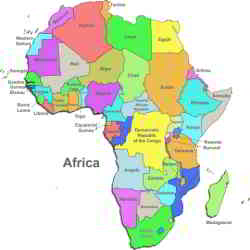Africa and other emerging economies are tipped as locations where property investors should look to for real growth in the next decade.

Meanwhile, Derrick Roper, chief executive officer of Novare Equity Partners, says investors looking to invest in the Sub-Saharan Africa growth story should consider property.
This is according to the Knight Frank/Citibank Wealth Report.
Lanice Steward, managing director of the Cape Peninsula estate agency Anne Porter Knight Frank, notes that in the last five years pundits reported a steady increase in capital flows, including property investment to the Far East including China, India, Singapore, Hong Kong, Taiwan and Malaysia.
She says it is interesting to note that just on 80 percent of the 6 000 high net worth individuals who participated in the Knight Frank survey are either satisfied with or optimistic about the future wealth creation prospects in Africa.
Although 75 percent listed local political instability as a potential worry, a high figure, 82 percent rated global economic problems as just as threatening.
Residential property values in Africa on average rose by 8 percent in 2011.
Coming off very low initial bases, African property has proved to be a star performer, when many Asian countries after phenomenal growth dropped back in 2011.
Steward points out that the International Monetary Fund predicts that the emerging economies will expand by 5.4 percent this year and 5.9 percent in 2013.
This significantly outpaces the GDP growth of 1.2 percent this year and 1.9 percent forecast for the advanced economies.
Citibank’s chief economist, Willem Buiter predicts that the North American and Western European share of global GDP will fall from its 2010 level of 41 percent to just 18 percent by 2050.
He also predicts that China will overtake the US as the world’s economy by 2020 and that by 2050 India will be in the top spot.
Other fast growing economies will be Bangladesh, Indonesia, Iraq, Mongolia, Nigeria, The Philippines, Sri Lanka and Vietnam - in most cases the chief reason for this being that they have exportable natural resources, he says.
Meanwhile, Derrick Roper, chief executive officer of Novare Equity Partners, says investors looking to invest in the Sub-Saharan Africa growth story should consider property.
He notes that economic growth is expected to remain strong in the region, and emerging middle class and consumer spending all bode well for property investing.
Property experts say Africa real estate is poised for growth driven by all of the above and rapid urbanisation in many African cities.

Residential property values in Africa on average rose by 8 percent in 2011.
Click here to read the article.
“Urbanisation facilitated by improving infrastructure makes it easier for property developers to optimise utilisation by concentrating property investments in areas where more people live,” says Roper.
He points out that the young, affluent and urban African middle class is looking for modern offices, retail complexes and housing.
At present the supply of these facilities is limited, with the lack of modern shopping space in many cities in sub-Saharan Africa a good example.
Roper notes that investing in longer term projects in the region is not always easy as is finding the right properties coupled with slow legislation for deals to go through.
“Although construction costs and professional fees are relatively high, superior real rental yields of over 10 percent for retail, residential and industrial properties are achievable.”
Currently, the best route to gain exposure to the property market in Sub-Saharan Africa is to invest directly or via one of the growing number of private equity vehicles, he says.
“Given the still difficult landscape faced by property developers and investors, it is advisable to partner with a company that has a track record in the countries in which it is operating.”
He adds that strong local networks as well as support structures are valuable in getting things done and in understanding the nuances that differ from one market to another. – Denise Mhlanga









